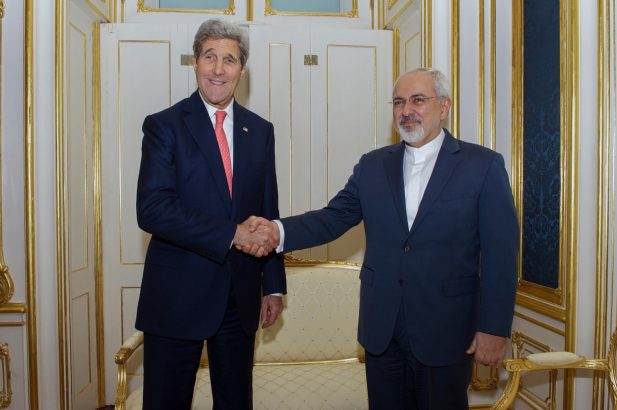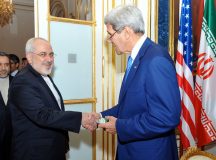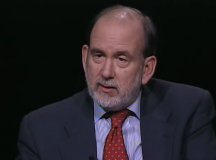Ben Cohen explores the Obama administration’s masterful success in persuading so many American influencers to buy into a delusion about Iran – that it is a state we can do business with because it is pursuing its reasonable national interests within a framework of internationally agreed principles, embracing a previously hidden sense of civic responsibility towards ordinary Iranians alongside its newly-boosted political and military influence. Successful the communications strategy has been, but delusion it is, nonetheless Cohen insists. Moreover, he warns, what started as a delusion has now become a strategic point of departure, and there may yet be real-world victims of this administration’s communications success.
As American journalists circled obsessively around Donald Trump’s verbal outbursts and Hillary Clinton’s email tribulations during a long, hot summer of electoral fever, the Foreign Minister of Iran, Javad Zarif, embarked on a tour of Latin America that was barely noticed, let alone remarked upon, in the media.
This is significant in and of itself, because Zarif is the Iranian official most closely associated with the flimsy nuclear deal, known as the Joint Comprehensive Plan of Action (JCPOA), agreed to by Tehran and world powers led by the US (the so-called P5+1) in July 2015. Bespectacled, neatly dressed, articulate, and outwardly affable, Zarif came to personify the notion that, after more than a decade of sanctions and UN Security Council resolutions demanding an end to Iran’s clandestine nuclear activities, the Islamist regime had finally become a responsible actor on the international stage.
In some ways, this was an image pushed by the Americans more than by Zarif himself. On the day that the JCPOA was announced, Secretary of State John Kerry lifted the veil on his relationship with ‘Javad’ before the legions of reporters and photographers in Geneva. ‘We were both able to approach these negotiations with mutual respect, even when there were times of heated discussion’, Kerry related. He continued: ‘And – he would agree with me – at the end of every meeting we laughed and we smiled and we had the conviction that we would come back and continue to process.’
One year later, Zarif was in the Cuban capital, Havana, offering succour to the gerontocratic communist regime of Raul Castro by railing against the ‘atrocities’ committed by the ‘empire’ of the US. A few days later, Zarif turned up in the Venezuelan capital, Caracas, to reassure the thuggish President Nicolas Maduro of Iran’s unwavering solidarity. Outside of the ornate reception room where Zarif held a press conference with Maduro’s Foreign Minister, Delcy Rodriguez, lay an entire country gripped by food shortages and convulsed with protests against the dying regime of ‘chavismo’, a nationalistically-tinged form of socialism instituted by Maduro’s predecessor, the late Hugo Chavez. If Zarif was moved by any of this, he certainly didn’t make those feelings known, waxing lyrically about a ‘new dynamism’ in relations between Venezuela and Iran, and signing six separate trade deals with a regime that a majority of Venezuelans are fighting to overthrow.
The point is not that Zarif should have been expected to conduct himself differently. Iran’s penetration strategy in Latin America – including its sponsorship of terrorist attacks like the 1992 bombing of the Israeli Embassy in Buenos Aires, and the 1994 bombing of the AMIA (Asociación Mutual Israelita Argentina) Jewish Center in the same city – is founded upon an alignment with impeccably anti-American and authoritarian governments like those visited by Zarif. Rather, the significance of his Latin American jaunt lies in the fact that the Obama administration’s pivot in the Middle East, which has directly empowered the Iranians and their regional allies like Syria’s Bashar al-Assad regime and Hezbollah in Lebanon, has triggered a profound transformation in the broader American discourse about Iran. Instead of taking Iranian officials at their word, we are encouraged to dismiss their inflammatory statements as mere rhetoric without consequence, as lip service to the Islamist revolutionary principles that supposedly nuanced diplomats like Zarif are, regrettably, compelled to work within.
The delusion that Iran has embraced a previously hidden sense of civic responsibility alongside its newly-boosted political and military influence has been aggressively promoted by the Obama administration, and faithfully echoed by media outlets like the New York Times, think-tanks like Center for American Progress, and advocacy groups like the National Iranian-American Council (NIAC), which effectively functions as the Tehran regime’s lobby in Washington. And in one sense, this is a direct outcome of the foreign policy doctrine developed and refined by the Obama administration.
In essence, America has been in open retreat, led by a president who regards the 2003 Iraq War as a fatal error that fanned anti-American sentiments in the Muslim world, and the earlier war in Afghanistan against the Taliban and Al-Qaeda as a deeply misguided exercise in nation-building. To be precise, Obama has not used the White House as a platform for the fixed dogmas of the anti-war movement. But his willing acceptance of the contention that US global power needs to be tamed and even humbled has, inevitably, encouraged the parcelling of the world’s regions into spheres of influence dominated by lesser, yet emboldened, powers.
In Eastern Europe, we have seen the results of this policy in the context of Russia’s invasion of Ukraine. In the Middle East, the contraction of American power has been matched by Russian and Iranian expansion, an evolving alignment that has strengthened the dictatorship of al-Assad in Damascus and cemented the belief in American policy circles that the Moscow-Tehran axis is an ally in the war against ISIS. This belief is prevalent not only among Obama’s own advisers, but one eagerly adopted by Republican presidential nominee Donald Trump.
It is a grotesque irony of Obama’s Middle East policy that its underlying assumptions should be shared by someone like Trump, who famously slandered the president as the ‘founder’ of ISIS. But it also shows the political entrenchment of Obama’s negotiating strategy with the Iranians; as much as Trump has complained about Obama’s mollifying of the ruling mullahs, his own policy would further enable the spread of Russian influence – and by extension, that of Iran – and assiduously ducks the question of why Americans should empower Shi’a Islamists at the expense of Sunni ones.
Trump could have excoriated Obama when the Wall Street Journal recently revealed that the ‘red lines’ declared in 2013, were quietly dropped after al-Assad’s deployment of chemical weapons, so as not to antagonise the Iranians at a delicate stage of the nuclear negotiations. He did not do so because, like Obama, Trump firmly rejects the prospect of again deploying significant American force into the midst of sectarian conflicts in the Middle East. Moreover, Trump has on many occasions described al-Assad as a partner in the war against ISIS, despite referring to the Syrian dictator as a ‘bad guy’ – much as his nemesis, Obama has done.
Yet a policy is nothing without a communications strategy to complement it. And it is here where Obama’s inversion of Iran from an integral element of former President George W. Bush’s ‘Axis of Evil’ into a state that pursues its national interests within a framework of internationally agreed principles has been masterful. So masterful, in fact, that one might say that Americans will eventually become victims of the administration’s own success.
Back in August, Washington was shaken by a lengthy profile of Obama’s deputy National Security Adviser, Ben Rhodes, published in the New York Times magazine by the journalist David Samuels. Samuels’s detailed piece excavated the underlying strategy in Obama’s presentation of the Iran nuclear deal to the American media.
For example, in a 2015 interview with The Atlantic’s Jeffrey Goldberg, the President, after explaining that he understood the public’s misgivings over the deal better than anyone because ‘it’s my name on this’, went on to argue that Iran could be trusted to spend sanctions relief worth approximately $100bn on its people rather than its military. ‘[President Hassan] Rouhani and, by extension, the supreme leader have made a series of commitments to improve the Iranian economy, and the expectations are outsized. You saw the reaction of people in the streets of Tehran after the signing of the agreement. Their expectations are that [the economy is] going to improve significantly’, Obama told Goldberg.
As Samuels’s article revealed, the narrative that Iran would spend its sanctions windfall in much the same way as would the Netherlands or Canada was conjured up by Rhodes at least one year before Rouhani was elected Iran’s president in 2013 – from a pool of candidates handpicked by the fanatical Supreme Leader, Ayatollah Ali Khamenei – which the White House then presented as a victory for the ‘moderates’ in Tehran. ‘The idea that there was a new reality in Iran was politically useful to the Obama Administration,’ Samuels wrote. He went on to say: ‘By obtaining broad public currency for the thought that there was a significant split in the regime, and that the administration was reaching out to moderate-minded Iranians who wanted peaceful relations with their neighbours and with America, Obama was able to evade what might have otherwise been a divisive but clarifying debate over the actual policy choices that his administration was making.’
Notwithstanding Samuels’s admiration for Rhodes’s undoubted talents as a communicator, the contention that Rhodes had sold a serious delusion about Iran was evident in his article. But as Rhodes himself put it, the Iran deal was about exploding the conventions that had governed thinking about Iran since the 1979 revolution: ‘It’s the possibility of improved relations with adversaries. It’s nonproliferation. So all these threads that the president’s been spinning — and I mean that not in the press sense — for almost a decade, they kind of all converged around Iran.’
Still, while the profile of Rhodes sent tongues wagging, with a chorus of ‘we told you so’ emanating from conservative media outlets, the Obama administration has continued to pursue its Iran outreach with unabashed zeal. Those inside the administration who dared to express doubts about the broader ramifications of the Iran policy – like the author and human rights advocate Samantha Power, who serves as US ambassador to the UN – were summarily dismissed from the conversation. (‘Samantha, I’ve already read your book’, Obama reportedly snapped at Power after she raised al-Assad’s bloody war crimes during a cabinet meeting.)
Indeed, the outcomes of the JCPOA are being felt in policies related to the deal specifically as well as the subject of wider Iranian regional influence. To begin with, there is the issue of financial transfers to Iran, which has raised awkward questions from journalists at both White House and State Department briefings. Earlier this year, a total of $1.7bn was airlifted to Iran in cash. According to the administration, this money paid off the interest on Iranian financial assets held by the US since the 1970s. According to Republican critics like Florida Senator Marco Rubio, the money was essentially a ransom payment for the release of American prisoners held in Iran. No-one can say for sure whether this cash ended up in the hands of Iran’s Revolutionary Guards Corps (IRGC), but the concern is a credible one.
Yet the administration chose to obfuscate the matter rather than clarifying it, conflating this cash sum with the separate sum of $100bn paid to the Iranians in sanctions relief. When White House Press Secretary Josh Earnest was asked by a reporter about the prospect that the $1.7bn ‘could be handed off and distributed to terrorists’, Earnest answered by talking about the $100bn. ‘The CIA Director just last week addressed concerns that had been raised by critics of the deal about how money that Iran has received since January has been spent in Iran,’ he said. ‘And I don’t want to ruin the surprise here, but the Iranian government has spent the money largely in the way that we expected that they would… Their infrastructure was crumbling. So we know that they used revenue from sanctions relief to start investing in infrastructure.’ Pressed still further, Earnest countered, ‘well, first of all it’s Iranian money’, going onto accuse those investigating whether the mullahs had used the $1.7bn to further prop up the al-Assad regime of being ‘either badly misinformed or lying to the American public’.
As the dusk closes in on Obama’s final months in office, its Iran delusion – the lynchpin, as Ben Rhodes himself said, of Obama’s foreign policy doctrine – carries on at full speed. Its latest manifestation surfaced in September, when the hapless Kerry announced alongside Russian Foreign Minister Sergey Lavrov that Washington and Moscow would now be cooperating in the fight against ISIS – an astonishing reversal of a policy that, at least on paper, contained the demand for al-Assad’s removal. While the relationship between Iran and Russia has historically been tense, their interests in Syria align to the extent that Russian fighter planes have been using Iranian bases to launch horrific bombing raids against largely civilian targets.
The expectation that the JCPOA would lead to a new era of Iranian power has come to pass. The Iranians do not have carte blanche to do as they please, but any restraints on them are likely to be imposed by the Russians rather than the Americans. Clinton has remained silent on the details of her Iran policy, beyond making her basic scepticism about the Iran deal known, while Trump has used bombast to camouflage his reluctance to offend Russian President Vladimir Putin, warning the Iranians that their ships will be attacked if they approach US naval vessels, but studiously avoiding the implications that would come from such a clash.
What started as a delusion stoked by the Obama administration has now become a strategic point of departure. The two key measures for dealing with Iranian aggression – robust sanctions and military action – have virtually disappeared at a time when the war in Syria is intensifying and fears of a new Hezbollah assault on Israel are increasing. For that reason, the question of why so many American influencers bought into the Iran delusion will be superseded by a much more urgent one: how to stop the Iranian advance during the next American presidency.






































Comments are closed.